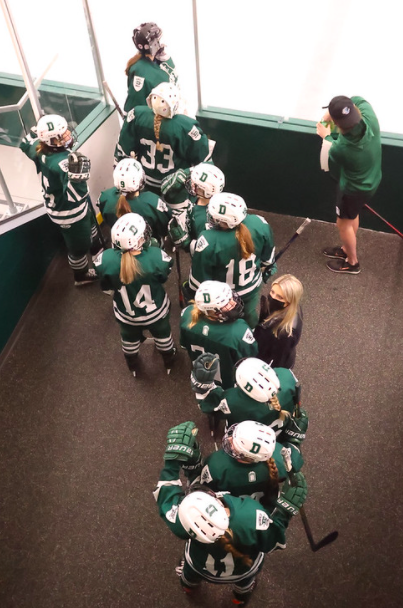After a relatively healthy fall term, students have re-adjusted to wearing masks, testing more frequently, and adhering to other COVID-19 protocols this winter. While more positive cases have also impacted academics, students’ social lives, and the mental health of the entire Deerfield community, this wave of COVID-19 has acutely disrupted winter sports.

Due to COVID-19’s almost unnoticeable impact on the student body this fall, sports teams were able to practice and play games as normal. However, after Thanksgiving break, many winter sports games for teams such as hockey, swimming and diving, and squash were cancelled due to increasing concerns about the virus. Whether it was too many athletes being identified as close-contacts or other schools struggling with similar COVID-related issues, winter athletes were forced to be flexible.
COVID-19 has barred many athletes from playing, due to either their contracting of the virus or their being named a close contact. This frequent loss of players has forced winter teams to readjust often.
Thomas Lu ’23, a member of the Boys Varsity Basketball team, pointed out that athletes have also felt other impacts of the campus outbreak, saying, “It has been harder to connect as a team, because talking to someone with a mask on is completely different than talking to them without a mask on.” Lu added that the team “has always been short a couple guys this season because of COVID-19 and close contacting.”
On the other hand, Ryan McHugh ’23, a Boys Varsity Hockey player, said, “It was good to see the guys who remained step up and fill roles.” He added that COVID has “made the team closer” because they’ve had to come together to overcome these uncertain times.
Emma Gurnell ’22 from Girls Varsity Hockey shared that, due to game cancellations, she “can’t get dressed with [her] teammates in the locker room” and experience the other forms of team bonding that other teams have experienced. However, she added that game cancellations have made the team stronger in some ways, because they have held practices where they could “focus on [their] weaknesses.”
While sports cancellations have been hard for everyone, including fans, they are particularly impactful for athletes seeking college recruitment. The virus has left athletes with limited opportunities to get in-game film of their play and invite college scouts to watch their games. Game cancellations have also limited the amount of time that each athlete gets to play their sport against real-time competition.
Gurnell, a postgraduate student from Westminster School, reflected that in her season last year, she had no games. She added that she “is in a much better position already, having [multiple] games in [her] pocket” and that, when she gets on the ice, she is “playing for the people who didn’t get the opportunity last year.” Gurnell added a semblance of appreciation, as she credits the COVID-19 pandemic for making her realize that you cannot take any moment on the ice for granted.

